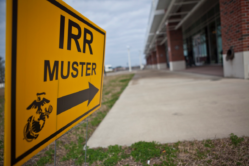There comes a time in everyone’s life where they have to make the decision to get out of the military. Whether it’s retirement or separation, everyone will eventually have to part ways with their service. In doing so, they will have to make one of many major decisions: “Where do I want to live?”
Personally, I’ve said the same thing to every Sailor that I’ve counseled: “When possible, you should transition from the same place you finished your last tour.” While there are some exceptions, such as moving closer to family, or for a truly compelling job offer, I fervently believe that if you’re considering a transition to civilian life, you should separate or retire at your most recent duty station. I would say that it’s important enough to consider a PCS move to the place where you intend to transition, if possible. Below are three reasons why.
1. Fewer Personal Life Adjustments.
Getting out of the military is tough, and the longer you’ve been in, the tougher that transition becomes. Adding the stresses of a PCS move to your job search & military transition checklist can be really daunting. If you’re moving to a place you’ve never been, you can add the stress of learning a new local geography to all of the other uncertainties you’re going to deal with. Every military family knows about the difficulties of a PCS move—finding schools, a primary care physician, dentist, your favorite stores, church, etc. Additionally, having to move to a place where you don’t know anyone can be extremely difficult. All of these adjustments can add to the significant stress you’ll go through as you transition.
Granted, if you’re in your 20s, separating after a 4-year enlistment, and are single with no children, this might be less stressful than if you’re retiring after a full career with a family and looking to find a place that’s similar to what you came from. Also, if your family is mentally prepared, properly budgeted, & looking to downsize from your current lifestyle, you may be more amenable to moving to an area with a lower cost of living. This may hold especially true for people transitioning from high cost of living areas such as Washington DC, San Diego, or Hawaii.
Finally, if you’re moving from a ‘one-off’ duty station to an area where you’ve already established roots in a military-concentration area, such as Norfolk or San Antonio, you might be better positioned to deal with the move.
2. Easier Military Transition.
You’re going to have a long list of things to do, especially if you’re retiring. Transition Assistance Program (TAP), your out-processing physical & VA disability claim, and all of the other administrative paperwork that goes into your transition—if there are any mistakes, omissions, or missing paperwork, that can affect any number of things, whether it’s your entitlements, benefits, retirement pay, or even your ability to transition on time. If there are corrections that need to be made, or if paperwork needs to be resubmitted, it is easier to correct those things if you’re staying local.
3. Local Networking Opportunities.
This could possibly be the most important reason to stay local. Every military family recognizes the importance of a support network, and there is no more important time to have one to help you through some of life’s sticking points than when you’re going through a significant transition. However, being able to use the last two or three years of your tour allows you to develop those true community links that will really help you in establishing your post-military life—whether it’s your church, local business associations, homeowner’s association, or any number of non-military affiliations.
For example, my financial planning firm’s name is Westchase Financial Planning. Westchase is the community in which my family and I live, and one of my goals is to be the financial planner of choice within the Westchase community. Retiring to the Tampa area after a 3-year tour at MacDill Air Force Base allows me to find volunteer opportunities within the local homeowner’s association, network within several local business associations, and work with local businesses—all of which are things that I believe will help me succeed in the long term.
Being able to network within your local community will help you in just about any aspect of post-military life, whether it’s finding a job (or landing a GS billet at the base you’re stationed at), starting your own business, or if you’re not sure what you want to do & just need some time to figure it out. Having the opportunity to get a two or three-year head start on that networking can be a very simple way to kick-start that networking so that you and your family are closer to where you want to be.
Again, staying local isn’t for everyone. However, unless you have a solid plan that you’ve committed yourself to, you should seriously consider transitioning from your last duty station, or at least trying to get PCS orders (even if only for a year or two until you retire) to the place you would like to end up in retirement.



About the comments on this site:
These responses are not provided or commissioned by the bank advertiser. Responses have not been reviewed, approved or otherwise endorsed by the bank advertiser. It is not the bank advertiser’s responsibility to ensure all posts and/or questions are answered.